经典:牛津英语模块复习M7U4
- 格式:ppt
- 大小:1.37 MB
- 文档页数:63
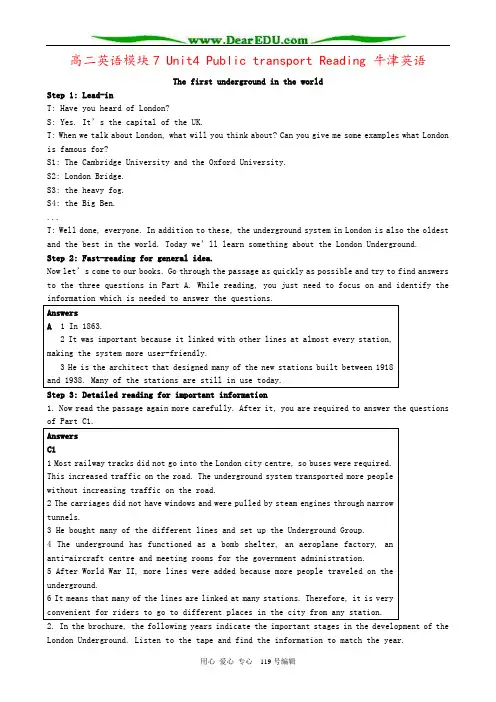
高二英语模块7 Unit4 Public transport Reading 牛津英语The first underground in the worldStep 1: Lead-inT: Have you heard of London?S: Yes. It’s the capital of the UK.T: When we talk about London, what will you think about? Can you give me some examples what London is famous for?S1: The Cambridge University and the Oxford University.S2: London Bridge.S3: the heavy fog.S4: the Big Ben....T: Well done, everyone. In addition to these, the underground system in London is also the oldest and the best in the world. Today we’ll learn something about the London Underground.Step 2: Fast-reading for general idea.Now let’s come to our books. Go through the passage as quickly as possible and try to find answers to the three questions in Part A. While reading, you just need to focus on and identify the information which is needed to answer the questions.AnswersA 1 In 1863.2 It was important because it linked with other lines at almost every station,making the system more user-friendly.3 He is the architect that designed many of the new stations built between 1918and 1938. Many of the stations are still in use today.Step 3: Detailed reading for important information1. Now read the passage again more carefully. After it, you are required to answer the questions of Part C1.AnswersC11 Most railway tracks did not go into the London city centre, so buses were required.This increased traffic on the road. The underground system transported more peoplewithout increasing traffic on the road.2 The carriages did not have windows and were pulled by steam engines through narrowtunnels.3 He bought many of the different lines and set up the Underground Group.4 The underground has functioned as a bomb shelter, an aeroplane factory, ananti-aircraft centre and meeting rooms for the government administration.5 After World War II, more lines were added because more people traveled on the underground.6 It means that many of the lines are linked at many stations. Therefore, it is veryconvenient for riders to go to different places in the city from any station.2. In the brochure, the following years indicate the important stages in the development of the London Underground. Listen to the tape and find the information to match the year.AnswersC2Date Event1854 An underground railway was decided to be built.1863 The first tunnels were opened.1868 The next section of the underground system was opened.1884 The underground service was provided in the middle ofthe city.1933 A public organization was created.1918-1938 London Transport was expanded.After 1945 More people traveled on the underground and more lineswere added.1977 The last line was added.3. Go through the passage again and find out how many parts can the passage be divided into. Step 4: Practice:1. Let’s complete Part D.Find these words in the text and try to guess their meanings according to the context, and then match the new words with their definitions.Answers1 d2 e3 b 4f 5 c 6 h 7 g 8 a2. Please finish Part E.Zhao Ning wrote an e-mail to a friend to tell him abut her trip to London. Here is part of her e-mail. Complete it using the words in the box.Answers(1) Underground (2) oldest (3) complex (4) 1863 (5)boundary(6) 1977 (7) carriages (8) user-friendly (9) World War II(10) bomb shelters3. Complete the following passage with proper words or phrases from the article on pages 50-51. Change the form where necessary.The London underground system has the (1) __________ of being the oldest and most complex underground system in the world. Before 1850, train services to London had already been (2) __________, but people couldn’t build railways into the city because doing that would cause great (3) __________ to many historic buildings. So many buses were needed to (4) __________ people to the city centre, which, however, often (5) __________ traffic. This problem led to the development of the underground system.In 1854, Metropolitan Railway Company was allowed to build an underground railway and the first tunnels were opened in 1863. In 1868, the next (6) __________ of the underground system was opened by another company called the Metropolitan District Railway. In 1884, these two companies (7) __________ and provided the underground service in the middle of the city.With the development of the (8) __________ ways of digging tunnels, the first railway tunnel under the River Thames was dug in 1884, and over the next 25 years, six (9) __________ deep underground lines were made. But because they were (10) __________ owned and far away from each other, traveling on these lines was (11) __________. Having seen the situation, Charles Yerkes,tried to improve the system. He bought many of the different lines and setting up the Underground Group. In 1933, a public (12) __________ called the London Passenger Transport Board was created, which eventually became London Transport. From 1918 to 1938, the system (13) __________ a lot.During World War II, the underground system had some (14) __________ uses. For example, many underground stations once (15) __________ as bomb shelters. After the war, more lines were added. Now, the network of the underground system includes 12 lines and goes 26 miles out of central London. Three million people travel on the underground every day. Can you imagine what London would be if there were no such underground system?Answer(1) distinction (2) developed (3) damage (4) transport(5) choked off (6) section (7) linked up (8) advanced(9) independent (10) separately (11) inconvenient (12) organization(13) expanded (14) unusual (15) functioned4. Complete the second sentence without changing the meaning of the first one in each pair of sentences.1) It is said that the two companies will cooperate with each other in the future to manufacture the new car.The two companies ____________ ____________ to ____________ ____________ in the future to manufacture the new car.2)They use special chemicals to make crops grow faster.They use special chemicals to ____________ the ____________ of crops.3)Because there existed the traffic problem, the underground system developed.The traffic problem ____________ ____________ the ____________ of the underground system.4) People hold kinds of activities to show respect for Cong Fei, a “father”of 183 poor studentsin the mountain areas.Kinds of activities are held ____________ ____________ ____________ Cong Fei, a “father”of 183 poor students in the mountain areas.5)They have been trapped in the flood caused by the third typhoon this year----Ewiniar. Theyare worried about the situation.____________ ____________ ____________ in the flood caused by the third typhoon this year----Ewiniar, they are worried about the situation.6) Do you know who is in charge of the design for the Three Gorges Dam Project?Do you know who is ____________ ____________ the design for the Three Gorges Dam Project? Answers1) are said; link up 2) accelerate; growth 3) led to; development4) in honour of 5) Having been trapped 6) responsible forStep 5: Post-reading activitiesRead the instructions for Part F and discuss the three questions that follow.Step 6: Language points:VocabularyWordsunderground, commonly, tube, distinction,distant, boundary, historic. Transport,vehicle, choke, shuttle, beneath, carriage,comparatively, narrow, section, district,advanced, accelerate, pace, inconvenient,separately, acquisition, board, authority,expansion, connection, architect, function,anti-aircraft, minister, administration,user-friendly, anniversary, effectively,network, permit, sightseeing, horrible, damp,dozen, union, discount, album,Usefulexpressionscause damage to, chock off, lead to, link up,be responsible for, be in use, be used as, linkwith, in honor of, in the middle of, at adiscount, function asSentence patterns 1. Unfortunately, the increased number of vehicles on the road choked off traffic, and the roads became so busy that no one could travel anywhere.2. Having seen the situation, a wealthy American businessman, Charles Yerkes, tried to improve the system by buying many of the different lines and setting up the Underground Group.3. This helped make the system more user-friendly.Step 7: Homework:1. Prepare the part Word Power2. Read the passages on Page 130 of the workbook.。
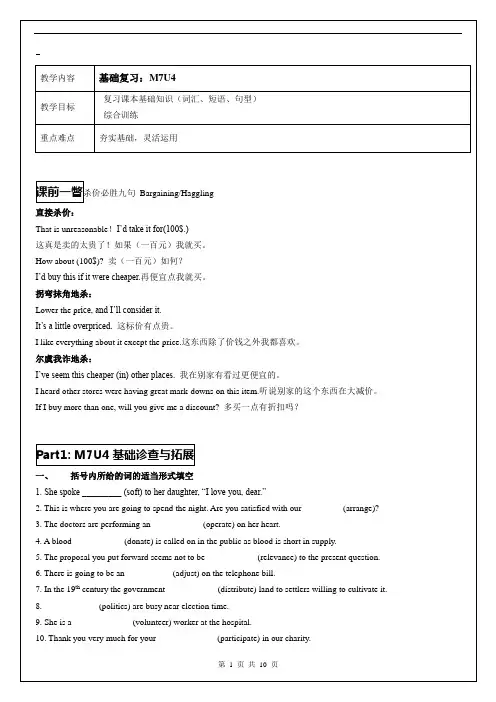
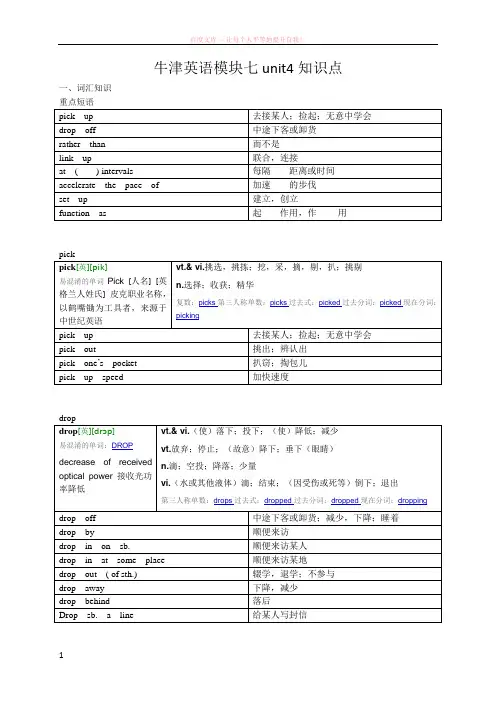
牛津英语模块七unit4知识点一、词汇知识重点短语pick up 去接某人;捡起;无意中学会drop off 中途下客或卸货rather than 而不是link up 联合,连接at (------) intervals 每隔------距离或时间accelerate the pace of 加速------的步伐set up 建立,创立function as 起------作用,作-------用pick[英][pik]易混淆的单词Pick[人名] [英格兰人姓氏] 皮克职业名称,以鹤嘴锄为工具者,来源于中世纪英语vt.& vi.挑选,挑拣;挖,采,摘,剔,扒;挑剔n.选择;收获;精华复数:picks第三人称单数:picks过去式:picked过去分词:picked现在分词:pickingpick up 去接某人;捡起;无意中学会pick out 挑出;辨认出pick one’s pocket 扒窃;掏包儿pick up speed 加快速度drop[英][drɔp]易混淆的单词:DROPdecrease of received optical power 接收光功率降低vt.& vi.(使)落下;投下;(使)降低;减少vt.放弃;停止;(故意)降下;垂下(眼睛)n.滴;空投;降落;少量vi.(水或其他液体)滴;结束;(因受伤或死等)倒下;退出第三人称单数:drops过去式:dropped过去分词:dropped现在分词:droppingdrop off 中途下客或卸货;减少,下降;睡着drop by 顺便来访drop in on sb. 顺便来访某人drop in at some place 顺便来访某地drop out ( of sth.) 辍学,退学;不参与drop away 下降,减少drop behind 落后Drop sb. a line 给某人写封信convey[英][kənˈvei]易混淆的单词:Convey [人名] 康维vt.传达,传递;运送,输送;[法]让与,转让(财产等);表达第三人称单数:conveys过去式:conveyed过去分词:conveyed现在分词:conveyingconvey sth. to sb. 向某人表达/传送某物convey sb. /sth. from A to B 把某人或某物从A地运送到B地convey one’s feelings / meanings /sorrow---- 表达某人的感情/意思/悲伤------convey transform transport三者间的区别convey:转达,通常是指不可见物质,如感觉,情绪,问候,信息等。
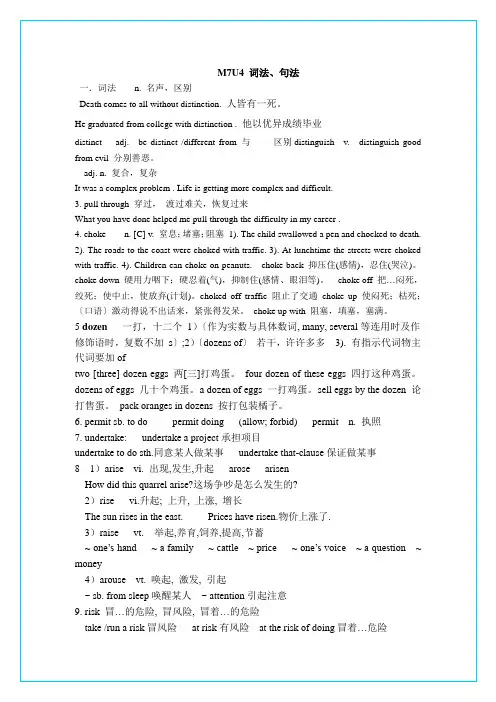
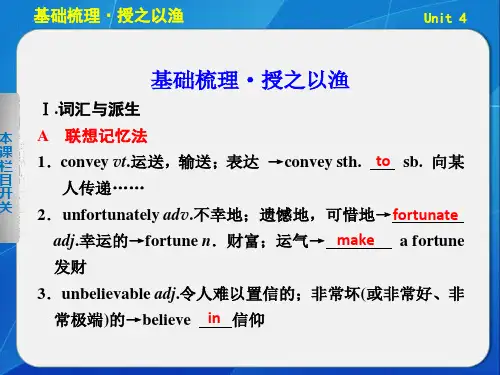
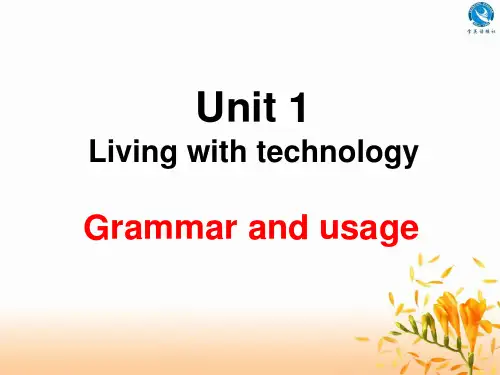
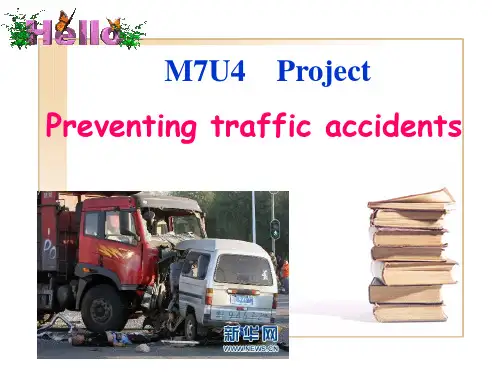
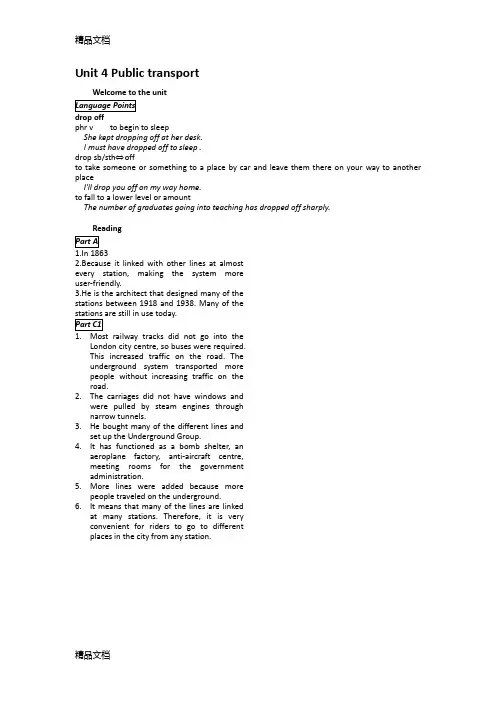
Unit 4 Public transportWelcome to the unitphr v to begin to sleepShe kept dropping off at her desk.I must have dropped off to sleep .drop sb/sth⇔offto take someone or something to a place by car and leave them there on your way to another placeI'll drop you off on my way home.to fall to a lower level or amountThe number of graduates going into teaching has dropped off sharply.Reading2.Because it linked with other lines at almostevery station, making the system moreuser-friendly.3.He is the architect that designed many of thestations between 1918 and 1938. Many of therailway tracks did not go into theLondon city centre, so buses were required.This increased traffic on the road. Theunderground system transported morepeople without increasing traffic on theroad.2.The carriages did not have windows andwere pulled by steam engines throughnarrow tunnels.3.He bought many of the different lines andset up the Underground Group.4.It has functioned as a bomb shelter, anaeroplane factory, anti-aircraft centre,meeting rooms for the governmentadministration.5.More lines were added because morepeople traveled on the underground.6.It means that many of the lines are linkedat many stations. Therefore, it is veryconvenient for riders to go to differentplaces in the city from any station.Event1854 An underground railway was decided to be built1863 The first tunnels were opened1868 The next section of the underground system was opened1884 The underground service was provided in the middle of the city1933 A public organization was created1918-1938 London transport was expandedAfter 1945 More people traveled on the underground and more lines were added1977 The last line was addedadj. far awayin the distant past/future: far away in the past or future:distance n. [C or U] the amount of space between two places:He travels quite a distance (= a long way) to work every day.Does she live within walking distance of her parents?1.boundaryn. -- the edge (Line5)The mountain becomes the national ~ for both countries.The fence serves as a ~ between the two buildings.the boundaries of knowledge2.historicadj. -- having importance in or influence on history (Line 6)11 November 1918 is a ~ day as it represents the end of World War I.Can you tell me when the ~ meeting between the two great leaders was held?Historic refers to what is important in history:the historic first voyage to outer spaceIt is also used of what is famous or interesting because of its association with persons or events in history:a historic houseHistorical refers to whatever existed in the past, whether regarded as important or not:a historical characterHistorical refers also to anything concerned with history or the study of the past:a historical novelhistorical discoveriesThe differentiation between the words is not complete. They are often used interchangeably: historic times or historical times3.choke (Line8)n. [C] v. 窒息;堵塞;阻塞1). The child swallowed a pen and chocked to death.2). The roads to the coast were choked with traffic.3). At lunchtime the streets were choked with traffic.4). Children can choke on peanuts.引申: chock back 忍住,抑制chock up 因激动等说不出话来4.link (Line21)v. [T] to make a connection between two or more people, things or ideas:1) The explosions are not thought to be linked in any way.•link up: to form a connection, especially in order to work or operate together:2)The organization's aim is to link up people from all over the country who are suffering fromthe disease.3)They linked up two areas by telephone.用法拓展:be connected with 与……相接,和……有联系5.place (Line 36)v. --to be in a state or situation1) She placed a tape recorder in front of her on the table.2) His uncooperative attitude placed us in an embarrassing situation.3) This job places great demands on the workers, which can be quite stressful.6.be responsible for (L39)be in charge of1)The driver is responsible for the passengers’ safety.2) Philip is the project manager. He is responsible for anything concerning the project.3) Who is responsible for making the dinner reservation?7.function as (L42)serve as1) My living room also functions as a study.2) The room functioned as a store room for keeping all our collection.3) The beautiful leaf functioned as a bookmark8.honor (L51)a quality that combines respect, pride and honesty:a man of honorWe fought for the honor of our country.n. [C] a reward, prize or title that publicly expresses admiration or respect:She received an honor for her services to the community.in honor of sb./ sth. in order to celebrate or show great respect for someone or sth.:a banquet in honor of the president9.permit (L57)v. -tt- [T] to allow sth.:The regulations do not permit much flexibility.[+do ing] The prison authorities permit visiting only once a month.[+ object + to infinitive] The security system will not permit you to enter without the correct password.10.beneathpreposition (formal)in or to a lower position than sb/sth; under sb/sth:They found the body buried beneath a pile of leaves. ◆The boat sank beneath the waves.not good enough for sb: He considers such jobs beneath him.◆They thought she had married beneath her (= married a man of lower social status).UNDERbeneath adverb: Her careful make-up hid the signs of age beneath.11.ordern. [U] 顺序in order of: 以……的顺序out of order:杂乱无序The children lined up in order of age/height.I can't find the file I need because they're all out of order (= they are no longer arranged in the correct way).Put the files in alphabetical order.12.discountn. [C] a reduction in the usual price:折扣They usually give you a discount if you buy multiple copies.They offer a 10 percent discount on rail travel for students.at a discount(a) at a reduced price 打折扣; 减价.(b) (fig 比喻) not highly valued; unfashionable 不受重视的; 不时兴的:Concern for others seems to be at (something of) a discount today. 如今好像不兴关心别人了.Word PowerLanguage Points1.rely on sb./sth.1) 依靠,依赖[+ ing form of verb] The success of this project relies on everyone making an effort.[+ to infinitive] I'm relying on the garage to fix the car by tomorrow.2) to trust someone or sth. or to expect them to behave in a particular way指望,期待British weather can never be relied on - it's always changing.[+ ing form of verb] Don't rely on finding me here when you get back (= I might have gone).I. 分词的构成分词分为现在分词和过去分词。
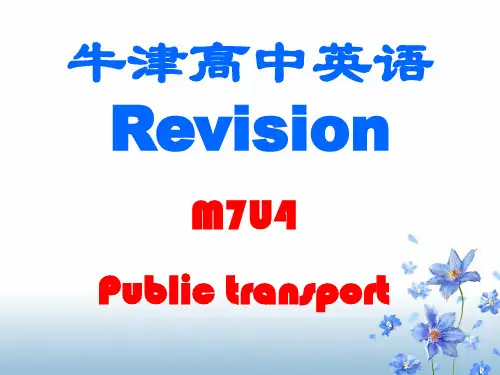
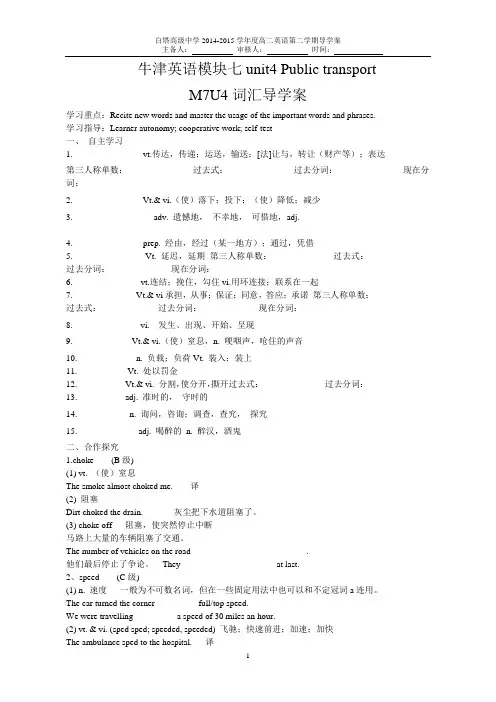
牛津英语模块七unit4 Public transportM7U4词汇导学案学习重点:Recite new words and master the usage of the important words and phrases.学习指导:Learner autonomy; cooperative work; self-test一、自主学习1._______________ vt.传达,传递;运送,输送;[法]让与,转让(财产等);表达第三人称单数:_______________过去式:_______________过去分词:_______________现在分词:_______________2. _______________ Vt.& vi.(使)落下;投下;(使)降低;减少3. _______________ adv. 遗憾地,不幸地,可惜地,adj._______________4._______________ prep. 经由,经过(某一地方);通过,凭借5._______________ Vt. 延迟,延期第三人称单数:______________过去式:______________过去分词:______________现在分词:______________6._______________vt.连结;挽住,勾住vi.用环连接;联系在一起7. ______________Vt.& vi承担,从事;保证;同意,答应;承诺第三人称单数:_____________过去式:_____________过去分词:_____________现在分词:_____________8. _______________vi. 发生、出现、开始、呈现9. _____________Vt.& vi.(使)窒息,n. 哽咽声,呛住的声音10. _____________n. 负载;负荷Vt. 装入;装上11.___________ Vt. 处以罚金12.___________Vt.& vi. 分割,使分开,撕开过去式:_______________过去分词:_______________13.___________adj. 准时的,守时的14. ___________ n. 询问,咨询;调查,查究,探究15.______________adj. 喝醉的n. 醉汉,酒鬼二、合作探究1.choke (B级)(1) vt. (使)窒息The smoke almost choked me. 译__________________________________________(2) 阻塞Dirt choked the drain. 灰尘把下水道阻塞了。
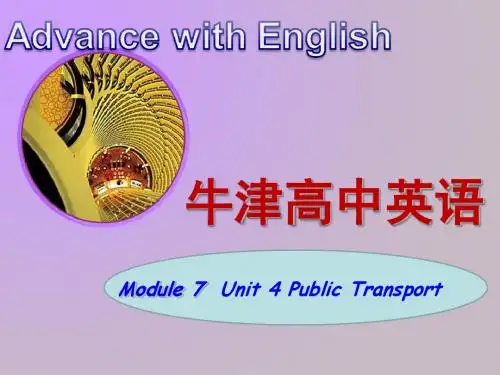
Module 7 Unit 4单词过关_____________ n. 地铁____________adv. 一般地,通常地____________. 声誉,名声,区别,差别____________adj. 远的,遥远的________ adj. 有历史意义的,历史上著名的________ vt. & n. 运输,运送,输送,搬运_____________ n. 车辆,交通工具_________________ (短语)阻塞__________ prep. & adv. 在……之下__________ adv. 比较而言,相对地_________ adj. 窄的,狭窄的;狭隘的_______________(短语)蒸汽机______________n.部分district n._________________________(短语)链接,会合___________ n. 中间,中部____________(短语)在…中间____________ adj. 高级的,先进的____________ vt. 加速,促进___________ n. 步伐,速度_____________adj. 不方便的,不便利的____________adv. 分别地,单独地,各自地_____________n. (尤指通过努力)取得,获得__________ n. 扩充,扩展,扩大,发展__________ n. 连接;连接物;联系;关系_____________n.建筑师__________vi. 起作用;工作,活动,运转minister n._____________ administration n.____________________________n. 周年纪念;周年纪念日user-friendly adj._________________________adv. 有效地__________ vt. & vi. 允许,准许, n. 许可证sightseeing n. _____________________adj. 可怕的,恐怖的;极其讨厌的dozen n.___________union n._____________________________(短语)打折album n.___________________vt.释放,排放___________n. 官员_________n. 增加,增长____________(短语)…希望….____________(短语)注意,注意到__________vi. 骑自行车____________(短语)更好地利用___________ vi. 目的是vt.将..瞄准, n.目标__________ vt. 使厌倦,使厌烦;使疲劳_________vt. 使糊涂,使困惑___________vt. 使恼怒,使生气,使烦恼__________vt. 承担,担任;着手做__________ vt. 牺牲,奉献__________prep. 在先之外,超出_________adj. 适度的,适中的,不过分的____________(短语)补偿,弥补_________ vt. 推迟,延迟,使延期_____________(______vt. & vi. 加速___________(短语)加速__________ n. 时间表___________ n. 离开,启程,出发___________(短语)冲垮,冲掉__________n. 修理,修补_____________(短语)正修理中,在修建中May Day____________________(短语)乘渡轮,乘渡船____________(短语)除…之外____________ adj. 准时的,准点的;守时的___________adj. 可靠的,可信赖的__________vi. 发生,产生,形成;______________(短语)由…引起______________(短语)目的是,旨在_____________adj. 极端的,极度的____________ n. 原因,起因;事业pedestrian n. ___________lorry n. ____________________adj. 周围的;环绕的 n. 周围环境__________ vi. 发信号_______________ adj. 不耐烦的,没耐心的_______________(短语)交通拥堵,塞车__________adj. 好斗的,侵略性的___________ vt. 罚…的款金 n. 罚金,罚款__________ n. 专心,专注;集中______________vt.大吃大喝___________adj.酒精的violate vt.___________________________n.一对,一双__________(短语)两个,两三个__________vt.不认真对待_________adj. 不负责任的chief n.______________________ n. 假定,臆想___________ vt. 使超载,使过载___________ adj. 不稳定的,摇摆的,摇晃___________ n. 诱因;邀请;请帖brake n./vt.__________________adv. 不正确地,错误地__________ adj. 有秩序的,秩序井然的。
wordM7 Unit 1 重点单词和短语Welcome to the unit1.技术进步2.令人非常吃惊的adj3.模糊地图片4.保持联系5.电子设备Reading6.At a media exhibition7.On the display boards8.无线传输9.远程播放10.有助于,对。
做贡献11.A ltogether12.U ncertain13.B e responsible for14.A llow15.彩色的16.比。
高级/低级17.建立。
标准18.能进入,接触到。
19.上市20.把。
相结合21.回复问卷调查22.上发条,卷绕最终。
,以做。
告终23.用于军事24.把。
应用于申请适合。
25.把。
增加到26.第一次27.正如名字所指28.到了如此的程度以至于29.涌现30.接收,占据31.I n demandmeet one’s demanddemand to dodemand that32.In order of time/importance33.A delightbring delight toto one’s delightTake delight inDelight in doing sthDelightful delighted34.就我而言,亲自35.各种各样的36.继续37.A ssume38.为了方便某人在某人方便时给。
带来便利某人做。
很方便Word power &Grammar39.百货商店40.为了娱乐41.家用电器42.被涂了一层。
43.相当简单44.M erely45.陪伴某人去做。
用钢琴给某人伴奏46.充足的阳光47.I n time for48.B y means of49.I n that case50.H ead for51.L ook into52.U p to date53.有能力做54.有某人决定55.错误的56.对。
很熟Task57.记下58.重要59.尤其60.最重要的是61.全方位的62.描述重量和大小63.内置的64.对。